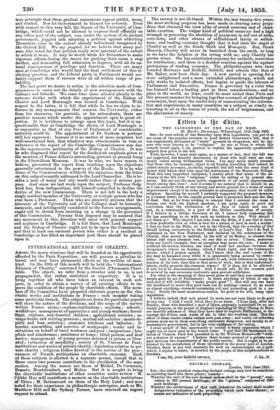INTERNATIONAL REUNION OF CHARITY.
Aseoiso the many reunions that will be founded on the opportunity afforded by the Paris Exposition, one will possess a peculiar in- terest, and may have permanent effects on the welfare of man- kind. On the 19th of thia month will be held the " International Reunion of Charity," convened by the Societe d'Economie Chari- table. The object, we infer from a circular sent to us, is not propagandist, but rather statistical or expository. It is to bring together all who have taken an interest in such sub- jects, in order to obtain a survey of all existing efforts to im- prove the condition of the people by charitable efforts. The mem- of the Committee have prepared elaborate papers on the cha- vitable works and institutions in France ; each member taking lome particular branch. The subjects set down for particular papers lull show the nature of the divisions, and the scope of the survey within France alone,—orphan-institutions ; asylums ; schools ; worifehops ; management of apprentices and young workers; found- orphans, and deserted children ; agricultural colonies ; sa- vings-banks and retiring pensions ; mutual aid societies ; monts-de- pike and loan societies; economic kitchens and bakeries ; li- braries, assemblies, and societies of workpeople ; works and in- stitutions on behalf of rural workmen and poor ; emigrations ; hos- pitals and almshouses ; assistance at home ; blind persons and deaf mutes ; management of young persons detained in prison or liber- ated ; extinction of mendicity ; society of St. Vincent de Paul; institutions and works of private charity; legislation relative to pri- vate charity ; religions bodies devoted to the service of the poor ; examen of French publications on charitable economy. Each of these subjects is allotted to a separate person, except that in three cases two persons contribute to the elucidation of the same section. Among the names are those of Michel, De Cormenin, Demetz, Montalembert, and Melon. But it is sought to bring the charitable institutions of other countries under review : M. -l'Alsbe lino will contribute a memoir on the charitable institutions of China ; Bettencourt on those of the Holy Land ; and men -noted for their experience in philanthropic enterprise, such as Mr. Matthew Hill and Mr. Sydney Turner, have received All urgent request to attend. The survey is not ill-timed. Within the last twenty-five years, the most striking progress has been made in clearing away preju- dices that obscured the view alike of sound economy and of chari- table exertion. The vulgar kind of political economy had a high triumph in procuring the abolition of-payments in aid out of rates, corn-laws, and other abuses of oldfaahioned laxity or selfish- ness; and trading economy thought that it had slain the angel of Charity as well as the fiends Sloth and Monopoly. But, thank Heaven, Charity will never be banished from the earth, so long as we have the helpless or the erring with us; only Charity has grown wiser. She has substituted economy for unthrift, correction for retribution; and there is a decided reaction against the upstart pretensions of trading economy. The philanthropists who have founded Mettraye and Redhill, Salthill, and schools like that of Mr. Baker, now have their day. A new period is opening for a more enlightened and a more extended philanthropy, which not only works by isolated efforts, but begins to guide the labours of Parliament and Executive. France is governed by a ruler who has himself taken a leading part in these considerations; -and no place in the world, no time, could be more suited than Paris and this present summer for bringing together a council of philanthropic economists, bent upon the useful duty of concentrating the informa- tion and experiences in many countries on a subject so vitally in- teresting to all as the rescue of youth, the aid of helplessness,.aml the alleviation of misery.


























 Previous page
Previous page